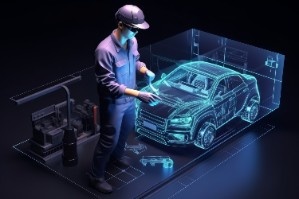
The Importance of Regular Car Maintenance: Expert Tips and Services
Regular car maintenance is vital for ensuring safety, enhancing performance, saving money, and prolonging the lifespan of your vehicle.

In the hustle and bustle of daily life, it’s easy to overlook the importance of regular car maintenance. However, keeping your vehicle in top condition is crucial for ensuring safety, enhancing performance, and prolonging its lifespan. This blog delves into why regular car maintenance is essential and offers expert tips and services to help you keep your car running smoothly.
Why Regular Car Maintenance Matters
1. Safety First
Safety is the most compelling reason for regular car maintenance. A well-maintained car is less likely to encounter sudden breakdowns or failures that could lead to accidents. Regular checks on brakes, tires, lights, and engine components ensure that your car is always ready for the road.
2. Enhanced Performance
Routine maintenance helps keep your car running at its best. Regular oil changes, air filter replacements, and engine checks ensure that your car operates efficiently, providing you with a smoother and more reliable driving experience.
3. Cost Savings
Preventive maintenance is much cheaper than major repairs. Identifying and fixing minor issues before they become major problems can save you a significant amount of money in the long run.
4. Longevity
Cars that receive regular maintenance tend to last longer. Keeping up with scheduled services ensures that all parts of the car are in good working condition, reducing the wear and tear that leads to early breakdowns.
5. Resale Value
A well-maintained car retains its value better than one that’s been neglected. If you plan to sell your car in the future, having a complete maintenance history can be a major selling point and can fetch you a higher price.
Essential Car Maintenance Tips
1. Regular Oil Changes
Changing your car’s oil at regular intervals is one of the simplest yet most important maintenance tasks. Fresh oil keeps your engine lubricated, reduces friction, and prevents overheating. Check your owner’s manual for the recommended oil change schedule.
2. Tire Maintenance
Maintaining the correct tire pressure, rotating your tires, and checking for wear and tear can prevent blowouts and improve fuel efficiency. Regularly inspect your tires for signs of damage and ensure they have adequate tread depth.
3. Brake Inspections
Brakes are critical for safety. Regularly check your brake pads, rotors, and fluid levels. If you notice any squeaking, grinding, or reduced braking efficiency, it’s time to have your brakes inspected and serviced.
4. Battery Care
A dead battery can leave you stranded. Regularly check your battery’s charge, clean the terminals, and ensure it’s securely mounted. Most car batteries last between 3-5 years, so consider replacement within this timeframe.
5. Fluid Checks
Your car relies on various fluids to function properly, including coolant, transmission fluid, brake fluid, and power steering fluid. Regularly check and top off these fluids to keep your car running smoothly.
6. Air Filter Replacement
A clean air filter ensures that your engine receives the proper air-fuel mixture for optimal performance. Replace your air filter every 12,000 to 15,000 miles or as recommended by your vehicle’s manufacturer.
7. Regular Inspections
Regularly inspecting your car can help you spot potential issues before they become major problems. Look for leaks, check belts and hoses for signs of wear, and ensure all lights and signals are functioning correctly.
Expert Car Maintenance Services

1. Professional Inspections
Taking your car to a professional for regular inspections can help identify issues that you might miss. Mechanics have the tools and expertise to thoroughly inspect your vehicle and recommend necessary repairs or maintenance.
2. Comprehensive Tune-Ups
A comprehensive tune-up typically includes checking and replacing spark plugs, inspecting the ignition system, adjusting the timing, and more. Regular tune-ups ensure that your car runs efficiently and reliably.
3. Engine Diagnostics
Modern cars are equipped with complex computer systems that monitor engine performance. Professional diagnostics can read error codes and identify issues within your car’s engine and other systems, allowing for precise repairs.
4. Brake Services
Professional brake services include inspecting brake pads and rotors, checking brake fluid levels, and ensuring the entire braking system is in good condition. This service is crucial for maintaining safe braking performance.
5. Tire Services
Expert tire services include tire rotation, balancing, alignment, and replacement. These services ensure that your tires wear evenly and provide optimal traction and fuel efficiency.
6. Transmission Services
Transmission issues can be costly if not addressed promptly. Regular transmission services include fluid changes, filter replacements, and inspections to ensure your transmission operates smoothly.
7. Air Conditioning Services
Regular maintenance of your car’s air conditioning system ensures it functions properly, especially during hot weather. Services include checking refrigerant levels, inspecting the compressor, and ensuring all components are working efficiently.
DIY vs. Professional Maintenance
DIY Maintenance
Some car maintenance tasks can be easily handled at home, such as changing the oil, replacing air filters, and checking tire pressure. DIY maintenance can save money and provide a better understanding of your vehicle.
Professional Maintenance
For more complex tasks, professional maintenance is recommended. Professionals have the expertise, tools, and equipment to perform detailed inspections and repairs that ensure your car’s longevity and safety.
The Role of Technology in Car Maintenance
1. Onboard Diagnostics (OBD)
Modern cars come with onboard diagnostic systems that alert you to potential issues. These systems provide error codes that can be read using an OBD scanner, helping you identify problems early.
2. Maintenance Apps
There are several apps available that help track your car’s maintenance schedule. These apps provide reminders for oil changes, tire rotations, and other essential services, ensuring you never miss a maintenance appointment.
3. Online Resources
The internet is a valuable resource for car maintenance tips and tutorials. Websites, forums, and videos provide step-by-step guides for various maintenance tasks, empowering car owners to perform basic upkeep themselves.
Conclusion
Regular car maintenance is vital for ensuring safety, enhancing performance, saving money, and prolonging the lifespan of your vehicle. By following essential maintenance tips and utilizing expert services, you can keep your car in top condition and enjoy a reliable driving experience. Embrace the role of technology in tracking and managing your car’s maintenance needs, and don’t hesitate to seek professional help for more complex tasks. Remember, a well-maintained car is not just a vehicle; it’s a dependable partner on all your journeys.